NRL 2023: Why the stocks on Mitchell Moses’ salary are begining to fall, Paul Kent
With Parramatta yet to record a win, the stocks on Mitchell Moses’ salary have begun to fall. If he was worth $1.25m at the start of 2023, what is his value now, asks Paul Kent.
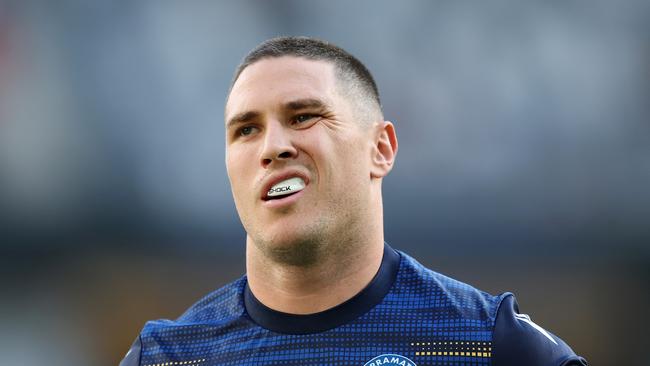
Opinion
Don't miss out on the headlines from Opinion. Followed categories will be added to My News.
Mitch Moses is perfectly justified in taking as long as he wants to sign a contract that will tie him to the Parramatta Eels for what’s left of his career, particularly given the kind of money spoken about is enough to result in several houses with ocean views or, failing that, to settle some small foreign debt.
The key, though, is the timing.
Not for Moses, but the Eels.
Parramatta fans walked away from 4 Pines Park Thursday night with the bitter taste of yet another loss in their mouths. Some say it was the 4 Pines but they were just being malicious, it was definitely the loss.
Already the faint hope left in their season is that the North Queensland Cowboys — and only the Cowboys in 2015 — were able to overcome a 0-3 start to the season like the Eels have now and go on to win a premiership.
All others have tried and failed in the NRL era.
A loss against Penrith next Thursday will be just about it for the Eels.
What does this say for Parramatta’s premiership window, which is starting to look more like a porthole now, and the massive amount they plan to pay Moses to make good on that.
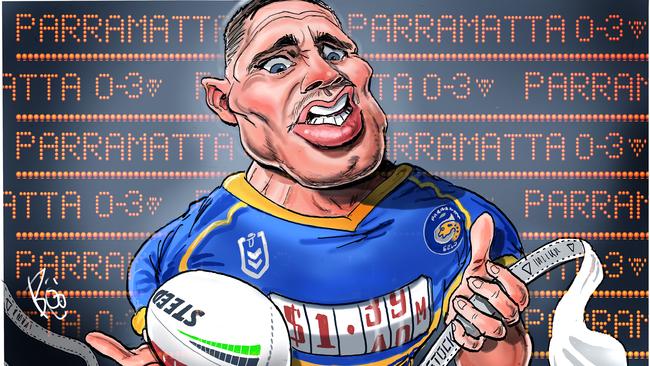
Parramatta has lost all three games to open the season while simultaneously trying to woo Moses into signing for four more years in the belief that he is the playmaker to deliver them their premiership.
Some have questioned whether the negotiations might be a distraction for his teammates and partly responsible for their poor start.
The answer is hardly. Modern footballers don’t roll that way.
Moses started the season as Parramatta’s prize bull in the stockade, the Eels backing their faith with an offer worth $1.25 million a season. That’s Australian dollars too, not lira.
The question is what has Parramatta’s start done to Moses’ value?
If he was worth $1.25 million before round one, when the Eels entered the season as grand finalists, what is he worth now that Parramatta is still winless?
The reason for the question is the same reason Moses is asking the kind of money Parramatta is prepared to hand over, the kind only playmakers can command.
Besides dishing the ball from the dummy-half to their outside men, halfbacks like Moses are almost always charged with managing the game for their teams, and the good ones achieve this better than others.
It is how they are judged and why they are paid in gold doubloons.
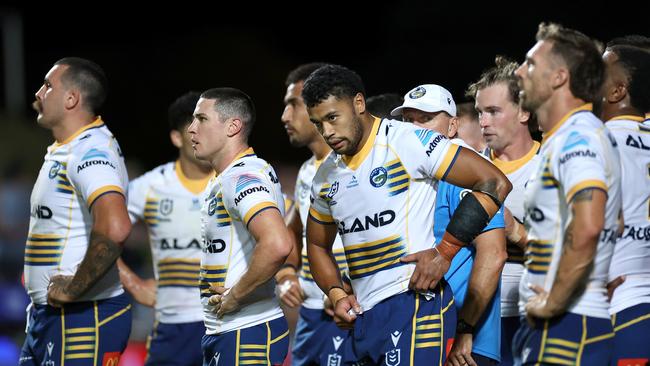
Moses has been shown flashes of brilliance in all three Parramatta losses. At the same time, though, smarter football brains than you will find behind this byline are prepared to concede that, with a little better game management, the Eels could have turned all three losses into victories.
It’s not like Parramatta was out of it in any of the three games.
In all three, for instance, Parramatta scored the same amount of tries as their opponents but fell short on the scoreboard, if you don’t include Harry Grant’s extra time try for Melbourne.
What also hasn’t escaped many Eels fans is that, as well as being the chief playmaker, Moses is the goalkicker.
Who can say if the stress of his contract negotiations has seeped into his game, despite what the evidence might say. His kicking percentage is down this year.
And it is fair to say there are other reasons Parramatta has come up short.
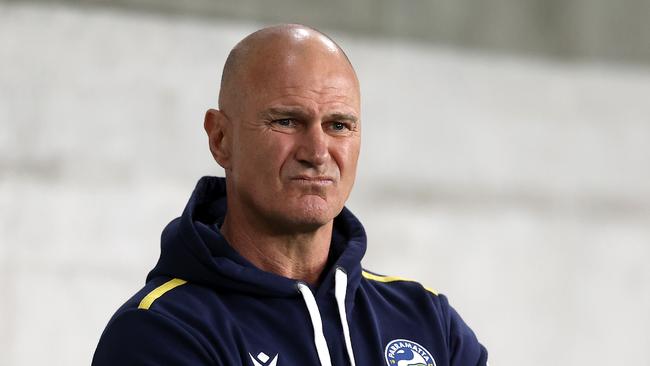
The four pillars of Brad Arthur’s coaching are energy, effort, toughness and repeatability. In other words, play tough and keep going.
Parramatta got bashed by the Manly forwards Thursday night and, while that happens, the disappointing part was they failed to return serve.
That had little to do with Moses.
That said, the final trick all the very good halfbacks conquer is the ability to kick their team out of trouble when they are playing off the back foot.
Here the Eels have come up short.
Earlier this week former Souths and Wests Tigers coach Michael Maguire said a lot without saying much at all on Fox Sports’ Matty Johns Podcast when he spoke about playmakers working over their opponents.
Maguire’s admiration for Cooper Cronk, sitting across the desk from him, was evident.
Maguire was spoiled somewhat, he now realises, during his time as an assistant at Melbourne.
Running the water one day he called a play for Cronk, Cameron Smith and Billy Slater to run against an opposition player. They worked on it during the week.
Hold on, Smith said. He wanted one more set to drill some more fatigue into them and then they’d hit the play.
A set later Smith called go and the trio worked over their tired defender and scored.
“That said a lot to me about what spines need to be doing in preparation, with their team, to be able to actually dissect teams,” Maguire said.
In essence, that is the playmaker’s job.
As the game has become more professional the normal assumption would be that the knowledge here has only advanced with greater professionalism, but that would be a mistake.
Before the show was done Maguire also lamented the fact that the modern footballer does not seem to watch as much vision on their rivals as there used to be.
Somewhere along the line, goes one theory, it was considered cool to be one of those players detached from the game, one who’d prefer to watch the NBA over the weekend instead of watching NRL.
Nathan Cleary is the best game manager in the NRL and watches more vision than anybody.
It raises a question for the Eels.
With the Eels unable to game-manage their way out of each of their three losses, and all winnable, have the stocks on Moses’ salary begun to fall?
It would be a reasonable assumption in other lines of business.
The recent salary cap rise has bent values out of shape for the moment and teams are quickly adjusting to what is a fair day’s pay for a fair day’s effort, given the position.
What hasn’t changed, though, is that million dollar a year players still need to be driving the result for their teams, winning those games when everything else is basically equal.
Moses has it in him, but with the contract still in the drawer, the time is now before the Eels get twitchy.
SHORT SHOT
Forget the sombrero, the NRL’s softly-softly approach to claims of salary cap rorting is the real concern as the game struggles to inspire credibility with the cap.
Just last week Brandon Smith’s manager Stan Martin went on the record to say an NRL club offered Smith “a backhander” to sign, which would not have been on the cap.
The easy response was put up or shut up. Name the club or risk suspension.
Allegations like that, from a man in the know, should not be allowed to pass by without consequence - it simply undermines the game’s integrity.
The NRL’s response to Martin has been disappointing.
A registration system should also be implemented at NRL headquarters. Under this, any offer to a player would have to be registered with the NRL and the player would be able to call in, identify himself, and see what offers there are.
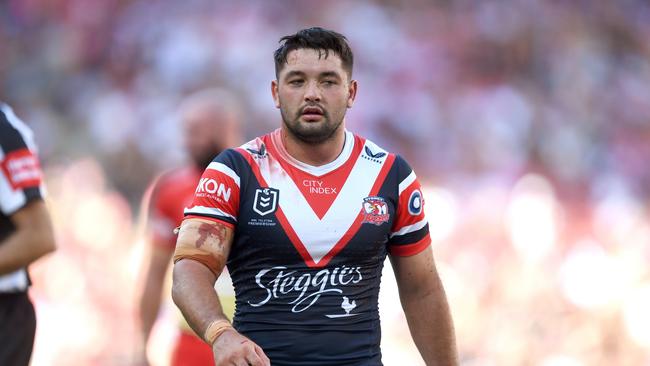
It is sad to say but you often hear of players being offered considerable money at some clubs but the offers fails to ever reach the player, unable to bypass through the manager who has ulterior reasons for the player to sign where he wants him to sign.
It happens.
There are numerous systems overseas where salary caps work and the NRL should mimic their systems.
Too often in the NRL dodgy managers get whipped with wet lettuce.
It got so comical recently that a banned manager would sit at his giant desk, with an underling seated on the other side, and players would call the underling for contract advice.
He would simply put the phone on speaker and business would be done, shouting across the desk.
Until whole agencies are banned for dodgy business some managers will never behave.





